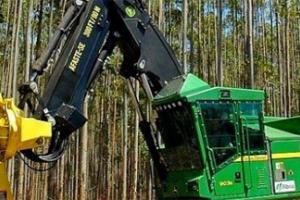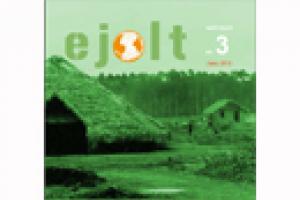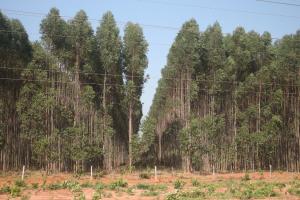The traditional communities known as geraizeiras at the Vale do Guará Settlement, in the town of Rio Pardo de Minas, north of Minas Gerais, denounce that an airplane spraying poison on a major eucalyptus plantation has hit the community, intoxicating 30 people, including children, elderly, youth and adults. They felt nausea, fever, vomit and itching skin. Airplane spraying is increasingly common in Brazil – the world's champion in pesticide use.
Brazil
Other information
30 September 2012
Bulletin articles
30 September 2012
The area planted with oil palm trees in Brazil used to be relatively small as compared to other countries producing this plant in Latin America. However, big transnational companies in Brazil like Vale and Petrobrás have revealed the rapid expansion of these plantations meant for the production of biofuels, in the Amazon region, mainly in the State of Pará.
Action alerts
21 September 2012
Civil society organizations are denouncing the FSC certification of Fibria Celulose SA monoculture tree plantations by IMAFLORA, a Brazilian certification body. The organization’s demands are aimed at supporting the social and environmental battle carried out by the populations suffering the effects of cellulose plant projects, in this particular case, those by the firm Fibria (formerly Aracruz Celulose).
Other information
30 August 2012
An article that analyzes the law passed in the Brazilian state of Acre in 2010 to create the State System of Incentives for Environmental Services (SISA). The law is considered a model and example for the world; however, it ultimately serves to turn over the state’s natural wealth, including its forests, to the financial speculation market.
Publications
11 June 2012
After many years of supporting local struggles and disseminating information from different countries on tree monocultures and its impacts, WRM presents a new report to all those involved in these struggle (1). No better time than the month of September 21st, International Day of Struggle against Tree Monocultures (2), to launch this new report.
Other information
30 May 2012
Other information
30 May 2012
Several months ago (see WRM Bulletin 172) we reported on the plans of Suzano Papel e Celulose S. A. – the world’s second largest pulp producer – to invest in biomass plantations. Biomass energy is one of the market-driven false “solutions” to climate change. It promotes land grabbing and diverts attention from the need to effectively reduce carbon dioxide emissions at the source.
Other information
30 May 2012
Veracel is expanding its operations in Brazil, with the consent of the government. The decision of the Institute of the Environment and Water Resources (INEMA) to grant preauthorization for the expansion of Veracel Celulose S.A. – a joint venture between Stora Enso and Aracruz – runs counter to a 2008 Federal Court ruling that revoked the environmental licence granted to the company in 1993.
Bulletin articles
30 May 2012
Nothing likes eucalyptus. If you let cattle loose among the eucalyptus, they start grazing around the outside, which is supposed to be a reserve. The cattle don't like it, neither do the birds, or the wasps. The hardest thing about a place like that is the wasps, but not even the wasps like to be where the eucalyptus is. (Video interview with Manuelzão, a character from the novel "Corpo de Bailes" by João Guimarães Rosa)
Bulletin articles
30 April 2012
Throughout history, rural areas have been occupied two different ways in Brazil. One of them is the colonial, capitalist and entrepreneurial way, which is nothing new, but has recently gained new momentum and adopted new methods. The other way of occupying rural land, which dates back to before the capitalist production model, is that of peasant agriculture, based on the way of life of indigenous peoples and traditional communities
Bulletin articles
29 January 2012
The year 2011 was declared the International Year of Forests by the United Nations. Major international events such as the climate conference in South Africa and the upcoming Rio+20 summit in Brazil and biodiversity conference in India have also contributed to making forests a key issue on the global agenda, as well as the subject of high-profile public relations campaigns.
Other information
30 December 2011
Governor Jacques Wagner and Environment Secretary Eugênio Spengler are preparing to give the people of the extreme south, south and southwest regions of the state of Bahia a SPECIAL CHRISTMAS PRESENT on December 21. The news has been leaked that regardless of the shortcomings of the corresponding EIA/RIMA (Environmental Impact Study/Environmental Impact Report), authorization will be granted for the expansion planned by Veracel Celulose. Although the EIA/RIMA contains numerous errors, this will pose no impediment.



